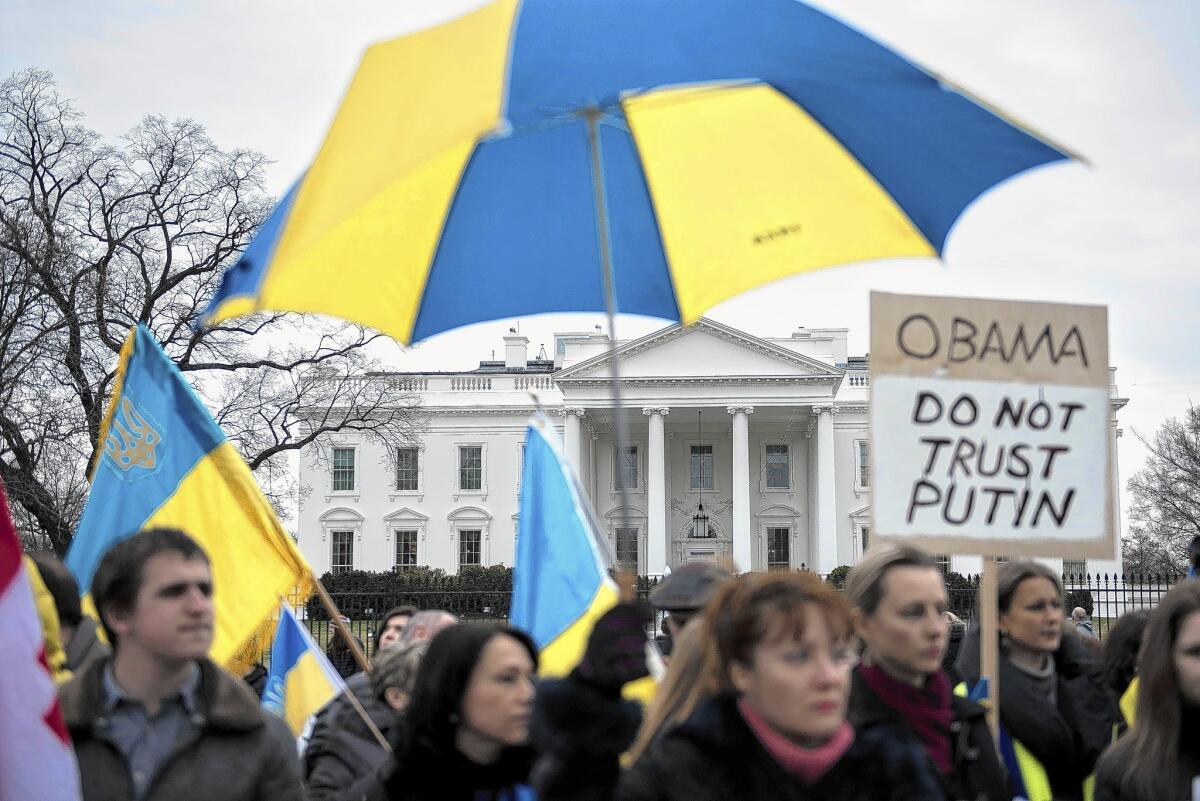Any U.S. steps to punish Russia unlikely to alter course in Ukraine

- Share via
WASHINGTON — President Obama has a variety of ways he can make good on his threat to make Russia pay “costs” for its military intervention in Ukraine.
But it’s not clear any of them will make a difference to Russian President Vladimir Putin, or whether they might simply underscore the United States’ relatively weak hand in the unfolding Ukraine crisis.
The U.S. and its European allies can take steps to isolate Russia diplomatically, which would undermine Putin’s claim that his country is again ascendant as a world leader. They can also take steps that would pinch the Russian elite, which relishes its access to Western Europe.
Some of the moves would sting. But none is likely to greatly change the behavior of Putin, experts say.
“Putin is prepared for this kind of international backlash,” said Eugene Rumer of the Carnegie Endowment for International Peace, who was the U.S. national intelligence officer for Russia until December. “In his mind, this won’t be paying too much of a price.”
Obama sought to step up the pressure Saturday, telling Putin in a 90-minute phone call that he would cancel U.S. participation in a June meeting of the Group of 8 leading industrial nations in Sochi, Russia, unless Moscow stopped what he called its “breach of international law.” He threatened “greater political and economic isolation” of Russia, and said the United Nations would consider action on the issue.
U.S. officials are also threatening to rebuff Russia’s expressions of interest in new trade deals and are likely to scratch a possible meeting between the two presidents discussed for sometime this year.
In addition, the administration and European allies could limit visas for travel by some members of the Russian elite, which would be uncomfortable. Many of the country’s elite enjoy their travel, own homes in Western Europe and count on sending their children to European schools.
Some North Atlantic Treaty Organization members in Eastern Europe have asked for consultations with others in the alliance, a step that usually leads to a strengthening of NATO forces in the region. Russia won’t like that. And the U.S. may soon announce troop deployments in the nearby countries, and perhaps naval deployments, to make a visible demonstration of their readiness.
However, a senior Pentagon official said Saturday that there had been no request from the White House for military options for Ukraine and no change in the posture of U.S. forces in Europe.
Putin’s action also probably means that the U.S. and allies will go ahead with their plans for a missile defense system in Eastern Europe, which has drawn angry denunciations from Moscow.
Obama, in his phone call with Putin, noted that U.S. officials were also consulting with countries that signed the Budapest Memorandum on Security Assurances. That 1994 treaty entitles Ukraine to seek help from countries, including the United States, when its security is threatened.
Some members of Congress are already calling for economic sanctions on Russia. But such penalties could be ineffective, unless the administration is able to enlist many other countries to make them stick. And it’s still not clear how far Europe is willing to support Washington in penalizing the Russians.
Europe has been deeply divided on how to deal with Ukraine. And U.S. efforts to enlist Europe have sometimes met strong resistance from the business community there, as happened in the early 1980s when Washington tried, unsuccessfully, to halt construction of a big natural gas pipeline from Russia to Western Europe.
These days Europe is far more dependent on Russian energy and more intertwined with its economy, which will make it more reluctant to punish Putin.
Unless many countries join in, as has happened in the case of Iran, economic penalties usually have limited punch.
Putin’s military moves will have one upside for the White House: They are making it much easier for officials to sell their request to Congress for an aid package for Ukraine, including loan guarantees and perhaps also direct aid.
As U.S. officials ponder their options, they also know that ineffective steps have a distinct downside.
They could end up just making the administration look weak, as happened with President Carter’s boycott of the 1980 Moscow Olympics over Russia’s invasion of Afghanistan, which failed to alter that military course.
Congressional Republicans are already criticizing the administration for not taking tough enough action to stop the Russians.
If Putin succeeded in bullying Ukraine through an intervention, without effective resistance from abroad, “this would be seen around the world as pretty much of a humiliation of the West,” said Francois Heisbourg, chairman of the London-based International Institute for Strategic Studies.
Times staff writers Kathleen Hennessey and David S. Cloud contributed to this report.
p>
Times staff writers Kathleen Hennessey and David S. Cloud contributed to this report.
More to Read
Sign up for Essential California
The most important California stories and recommendations in your inbox every morning.
You may occasionally receive promotional content from the Los Angeles Times.











